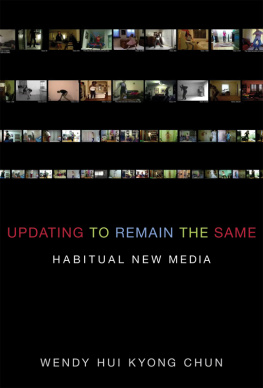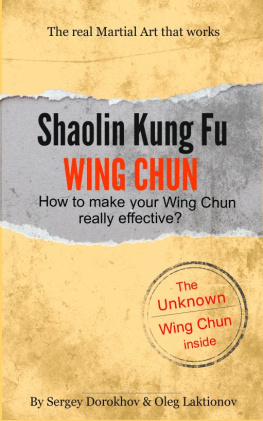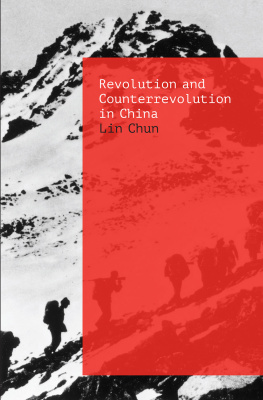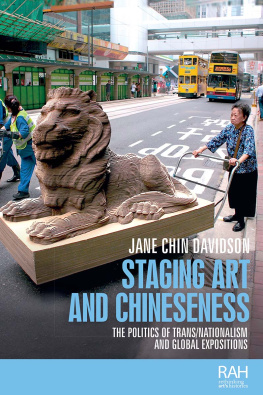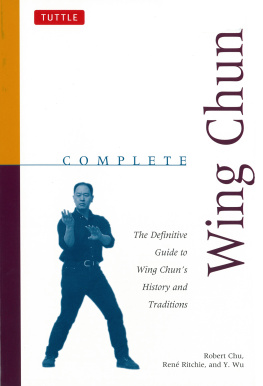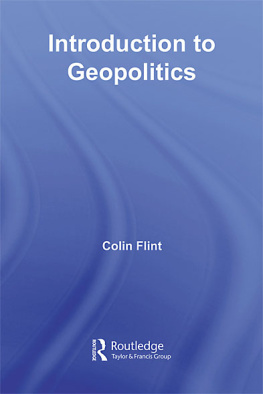Chun - FORGET CHINESENESS: on the geopolitics of cultural identification
Here you can read online Chun - FORGET CHINESENESS: on the geopolitics of cultural identification full text of the book (entire story) in english for free. Download pdf and epub, get meaning, cover and reviews about this ebook. City: New York, year: 2018;2017, publisher: State University of New York Press, genre: Politics. Description of the work, (preface) as well as reviews are available. Best literature library LitArk.com created for fans of good reading and offers a wide selection of genres:
Romance novel
Science fiction
Adventure
Detective
Science
History
Home and family
Prose
Art
Politics
Computer
Non-fiction
Religion
Business
Children
Humor
Choose a favorite category and find really read worthwhile books. Enjoy immersion in the world of imagination, feel the emotions of the characters or learn something new for yourself, make an fascinating discovery.
FORGET CHINESENESS: on the geopolitics of cultural identification: summary, description and annotation
We offer to read an annotation, description, summary or preface (depends on what the author of the book "FORGET CHINESENESS: on the geopolitics of cultural identification" wrote himself). If you haven't found the necessary information about the book — write in the comments, we will try to find it.
Chun: author's other books
Who wrote FORGET CHINESENESS: on the geopolitics of cultural identification? Find out the surname, the name of the author of the book and a list of all author's works by series.
FORGET CHINESENESS: on the geopolitics of cultural identification — read online for free the complete book (whole text) full work
Below is the text of the book, divided by pages. System saving the place of the last page read, allows you to conveniently read the book "FORGET CHINESENESS: on the geopolitics of cultural identification" online for free, without having to search again every time where you left off. Put a bookmark, and you can go to the page where you finished reading at any time.
Font size:
Interval:
Bookmark:

Forget Chineseness
SUNY series in Global Modernity
Arif Dirlik, editor
On the Geopolitics of
Cultural Identification
Allen Chun

Cover image: Nagee, used with permission
The cartoon, by the artist Nagee, depicts the singer Chou Tzu-yu, who delivered a formal apology in early 2016 for waving the flag of Taiwan while performing on a South Korean television show. The words above the picture say, Sorry, Ive been Chinesed. Today, its Chou Tzu-yu. Tomorrow, it will be you. It is deliberately written in passive tense (literally: I was sorried, I was made to be Chinese), which is not even proper Chinese but corresponds to the forced, hostage-like nature of the illustration.
Published by State University of New York Press, Albany
2017 State University of New York
All rights reserved
Printed in the United States of America
No part of this book may be used or reproduced in any manner whatsoever without written permission. No part of this book may be stored in a retrieval system or transmitted in any form or by any means including electronic, electrostatic, magnetic tape, mechanical, photocopying, recording, or otherwise without the prior permission in writing of the publisher.
For information, contact State University of New York Press, Albany, NY
www.sunypress.edu
Production, Ryan Morris
Marketing, Fran Keneston
Library of Congress Cataloging-in-Publication Data
Names: Chun, Allen John Uck Lun, 1952 author.
Title: Forget Chineseness : on the geopolitics of cultural identification / by Allen Chun.
Description: Albany, NY : State University of New York Press, [2017] | Series: SUNY series in global modernity | Includes bibliographical references and index.
Identifiers: LCCN 2016031420 (print) | LCCN 2016059728 (ebook) | ISBN 9781438464718 (hardcover : alk. paper) | ISBN 9781438464732 (ebook)
Subjects: LCSH: Chinese diaspora. | ChineseForeign countriesEthnic identity. | ChineseEthnic identity. | National characteristics, Chinese.
Classification: LCC DS732 .C595 2017 (print) | LCC DS732 (ebook) | DDC 305.800951dc23
LC record available at https://lccn.loc.gov/2016031420
10 9 8 7 6 5 4 3 2 1
Contents
Postwar, Post-Republican Taiwan:
Civilizational Mythologies in the Politics of the Unreal
Chineseness, Literarily Speaking:
The Burden of Tradition in the Making of Modernity
The Moral Cultivation of Citizenship as
Acculturating and Socializing Regime
The Coming Crisis of Multiculturalism:
When the Imagined Community Hits the Fan
Hong Kong Betwixt and Between:
The Liminality of Culture Before the End of History
Hong Kong before Hong Kongness:
The Changing Genealogies and Faces of Colonialism
Critical Cosmopolitanism in the Birth of
Hong Kong Place-Based Identity
Hong Kongs Embrace of the Motherland:
Economy and Culture as Fictive Commodities
The Reclamation of National Destiny:
On the Unbearable Heaviness of Identity
From the Ashes of Socialist Humanism:
The Myth of Guanxi Exceptionalism in the PRC
A New Greater China:
The Demise of Transnationalism and Other Great White Hopes
Confucius, Incorporated:
The Advent of Capitalism with PRC Characteristics
Who Wants to Be Diasporic?
The Fictions and Facts of Critical Ethnic Subjectivity
The Yellow Pacific:
Diasporas of Mind in the Politics of Caste Consciousness
Ethnicity in the Prison House of the Modern Nation:
The State in Singapore as Exception
The Postcolonial Alien in Us All:
Asian Studies in the International Division of Labor
Preface
Ethnicity as Culture as Identity: Unpacking the Crisis of Culture in Culturalism
This book is in part a follow-up to a paper published in 1996, titled Fuck Chineseness: On the Ambiguities of Ethnicity as Culture as Identity. At the same time, it is a reply to many queries by scholars over the years who were unsettled by aspects of that argument (including students who offered to write a sequel to it) and my repeated tendency to decline invitations to elaborate on the topic. I suspect that most of the commotion was caused by the obscene title, in which case I would add that it has probably led to many misreadings of the essay. The real subject matter was reflected in the subtitle, which had less to do with Chineseness per se than with muddles in the model involved, when sinologists and social scientists alike transform culture into culturalism. Thus to answer the obvious question, what does Chineseness say about China?, I would say little, at face value. China has been changing, perhaps sui generis, and notions of Chineseness have correspondingly changed as the subtle frame through which actors and institutions ideologically validate their ongoing existence. The same can be said about the various culturalist models that scholars deploy to make sense of China or any other society; they validate in the first instance the disciplinary mindset that inherently governs it.
In the same year, I presented essentially the same argument, albeit directed to a cultural studies or social theory audience, in an essay titled Discourses of Identity in the Changing Spaces of Public Culture in Taiwan, Hong Kong and Singapore.
Culturalism, of which Chineseness is a particular discursive representation, is less a social fact sui generis than a crisis invoked not necessarily by the inherent nature of culture but by situations of context. In other words, its imperative resides in essence outside culture. The fact that culture can be codified, systematized, regulated, and even commoditized in ways that are contrary to the spirit of lived experience is in short the source of many crises of modernity, ranging from conflicts pertaining to national identity, inventions of tradition, hegemonies of state, and the domination of culture industries, including mass media. Chineseness has thus been constructed in complex ways in diverse societies, the least of which is from the people themselves. While it is possible and desirable to interrogate Chineseness, one cannot do so without at the same time asking who is speaking for whom and toward what ends? There are also places where Chineseness (and its variants) has been so politicized that one can question whether its discursive manifestation and propagation really has anything to do with culture. Alternatively, one can look at the question in political terms too and ask, is it really necessary to culturalize at all? The content of Chineseness is less seminal than its form and function. On the other hand, it is possible to problematize Chineseness; to demystify, reinscribe, even engender and queer it. But explorations of alternative meanings as cultural critique have not been my primary concern. In the meantime, the ambiguity of ethnicity as culture as identity continues to be a problem endemic to social sciences, which I have elaborated on separately.
In short, this book is no longer about the ambiguities of ethnicity as culture as identity in a Chinese context but rather an effort to transcend such literal discussions of Chineseness and situate them within their respective historical contexts and underlying geopolitical formative processes. To problematize Chineseness as constitutive of an ongoing historical framework, from a comparative perspective and within a transnational or glocal context, serves to problematize the nature of contexts that invoke Chineseness as an ethnic or cultural problem, among other things. In the long run, Chineseness is just a superficial reflection of cultures embeddness or ongoing entanglement with more complex social institutional processes, such as modernity, colonialism, nation-state formation and globalization. A deeper probe into such institutions as processes per se should in turn offer a more nuanced articulation of culturality.
Font size:
Interval:
Bookmark:
Similar books «FORGET CHINESENESS: on the geopolitics of cultural identification»
Look at similar books to FORGET CHINESENESS: on the geopolitics of cultural identification. We have selected literature similar in name and meaning in the hope of providing readers with more options to find new, interesting, not yet read works.
Discussion, reviews of the book FORGET CHINESENESS: on the geopolitics of cultural identification and just readers' own opinions. Leave your comments, write what you think about the work, its meaning or the main characters. Specify what exactly you liked and what you didn't like, and why you think so.




